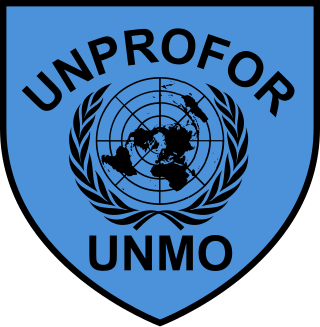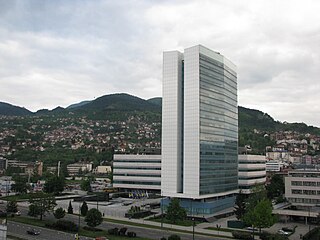
The Kosovo War was an armed conflict in Kosovo that lasted from 28 February 1998 until 11 June 1999. It was fought between the forces of the Federal Republic of Yugoslavia, which controlled Kosovo before the war, and the Kosovo Albanian separatist militia known as the Kosovo Liberation Army (KLA). The conflict ended when the North Atlantic Treaty Organization (NATO) intervened by beginning air strikes in March 1999 which resulted in Yugoslav forces withdrawing from Kosovo.
"Rogue state" is a term applied by some international theorists to states that they consider threatening to the world's peace. These states meet certain criteria, such as being ruled by authoritarian or totalitarian governments that severely restrict human rights, sponsoring terrorism, or seeking to proliferate weapons of mass destruction. The term is used most by the United States ; in his speech at the United Nations (UN) in 2017, U.S. President Donald Trump reiterated this phrase. U.S. politicians have used the term to describe countries such as Iran, Syria, North Korea, Afghanistan, Cuba and Venezuela. The term has been applied by other countries as well.

The NATO bombing of the Radio Television of Serbia (RTS) headquarters occurred on the evening of 23 April 1999, during Operation Allied Force. Sixteen employees of RTS were killed when a NATO missile hit the building.

The North Atlantic Treaty Organization (NATO) carried out an aerial bombing campaign against the Federal Republic of Yugoslavia during the Kosovo War. The air strikes lasted from 24 March 1999 to 10 June 1999. The bombings continued until an agreement was reached that led to the withdrawal of the Yugoslav Army from Kosovo, and the establishment of the United Nations Interim Administration Mission in Kosovo, a UN peacekeeping mission in Kosovo. The official NATO operation code name was Operation Allied Force whereas the United States called it Operation Noble Anvil ; in Yugoslavia the operation was incorrectly called Merciful Angel, possibly as a result of a misunderstanding or mistranslation.

The United Nations Protection Force was the first United Nations peacekeeping force in Croatia and in Bosnia and Herzegovina during the Yugoslav Wars. The force was formed in February 1992 and its mandate ended in March 1995, with the peacekeeping mission restructuring into three other forces.

Operation Deliberate Force was a sustained air campaign conducted by NATO, in concert with the UNPROFOR ground operations, to undermine the military capability of the Army of Republika Srpska, which had threatened and attacked UN-designated "safe areas" in Bosnia and Herzegovina during the Bosnian War with the Srebrenica genocide and Markale massacres, precipitating the intervention. The shelling of the Sarajevo marketplace on 28 August 1995 by the VRS is considered to be the immediate instigating factor behind NATO's decision to launch the operation.
Humanitarian intervention is the use or threat of military force by a state across borders with the intent of ending severe and widespread human rights violations in a state which has not given permission for the use of force. Humanitarian interventions are aimed at ending human rights violations of individuals other than the citizens of the intervening state. Humanitarian interventions are only intended to prevent human rights violations in extreme circumstances. Attempts to establish institutions and political systems to achieve positive outcomes in the medium- to long-run, such as peacekeeping, peace-building and development aid, do not fall under this definition of a humanitarian intervention.
The use of force by states is controlled by both customary international law and by treaty law. The UN Charter reads in article 2(4):
All members shall refrain in their international relations from the threat or use of force against the territorial integrity or political independence of any state, or in any other manner inconsistent with the purposes of the United Nations.

United Nations Security Council resolution 1244, adopted on 10 June 1999, after recalling resolutions 1160 (1998), 1199 (1998), 1203 (1998) and 1239 (1999), authorised an international civil and military presence in the Federal Republic of Yugoslavia and established the United Nations Interim Administration Mission in Kosovo (UNMIK). It followed an agreement by Yugoslav President Slobodan Milošević to terms proposed by President of Finland Martti Ahtisaari and former Prime Minister of Russia Viktor Chernomyrdin on 8 June, involving withdrawal of all Yugoslav state forces from Kosovo.
The political status of Kosovo, also known as the Kosovo question, is the subject of a long-running political and territorial dispute between the Serbian government and the Government of Kosovo, stemming from the breakup of Yugoslavia (1991–92) and the ensuing Kosovo War (1998–99). In 1999, the administration of the Autonomous Province of Kosovo and Metohija was handed on an interim basis to the United Nations under the terms of UNSCR 1244 which ended the Kosovo conflict of that year. That resolution reaffirmed the territorial integrity of Serbia over Kosovo but required the UN administration to promote the establishment of 'substantial autonomy and self-government' for Kosovo pending a 'final settlement' for negotiation between the parties.
The Military Technical Agreement, also known as the Kumanovo Agreement, signed between the International Security Force (KFOR) and the Governments of the Federal Republic of Yugoslavia and the Republic of Serbia, was an accord concluded on 9 June 1999 in Kumanovo, North Macedonia. It resulted in the end of the Kosovo War, and established new basic relations between Yugoslavia and the Kosovo Force, which would act to replace units of the Yugoslav Army in Kosovo.

United Nations Security Council resolution 1160, adopted on 31 March 1998, after noting the situation in Kosovo, the council, acting under Chapter VII of the United Nations Charter, imposed an arms embargo and economic sanctions on the Federal Republic of Yugoslavia, hoping to end the use of excessive force by the government.
United Nations Security Council resolution 1199, adopted on 23 September 1998, after recalling Resolution 1160 (1998), the Council demanded that the Albanian and Yugoslav parties in Kosovo end hostilities and observe a ceasefire.

United Nations Security Council resolution 1203, adopted on 24 October 1998, after recalling resolutions 1160 (1998) and 1199 (1998) on Kosovo, the Council demanded that the Federal Republic of Yugoslavia comply with previous Security Council resolutions and co-operate with the NATO and Organization for Security and Co-operation in Europe (OSCE) verification missions in Kosovo.

United Nations Security Council resolution 1239, adopted on 14 May 1999, after recalling resolutions 1160 (1998), 1199 (1998) and 1203 (1998), the Council called for access for the United Nations and other humanitarian personnel operating in Kosovo to other parts of the Federal Republic of Yugoslavia.

United Nations Security Council resolution 1345, adopted unanimously on 21 March 2001, after reaffirming resolutions 1160 (1998), 1199 (1998), 1203 (2000), 1239 (1999) and 1244 (1999) on the situation in the former Yugoslavia, the council condemned extremist violence and terrorist activities in parts of Macedonia and southern Serbia and called upon Kosovo Albanian leaders to condemn the violence.
The international reactions to the 2011 military intervention in Libya were the responses to the military intervention in Libya by NATO and allied forces to impose a no-fly zone. The intervention was authorized by United Nations Security Council Resolution 1973, approved in New York on 17 March, in response to the Libyan Civil War, though some governments allege participants in the operation exceeded their mandate.

The reaction in Greece to the Yugoslav Wars refers to the geopolitical relations between Greece and the countries that emerged from the breakup of Yugoslavia as a result of the Yugoslav Wars, as well as the international stance of the former during the years of the conflict in terms of activities by state and non-state actors.
Operation Eagle Eye was the result of the NATO-Kosovo Verification Mission agreement which was signed in Belgrade on 15 October 1998, under which the Federal Republic of Yugoslavia agrees to establish an air surveillance system consisting of NATO non-combatant reconnaissance aircraft and unmanned aerial vehicles.
Masters of the Universe? NATO's Balkan Crusade is a 2000 anthology of texts critical of the NATO bombing of Yugoslavia during the Kosovo War, edited by Tariq Ali.










